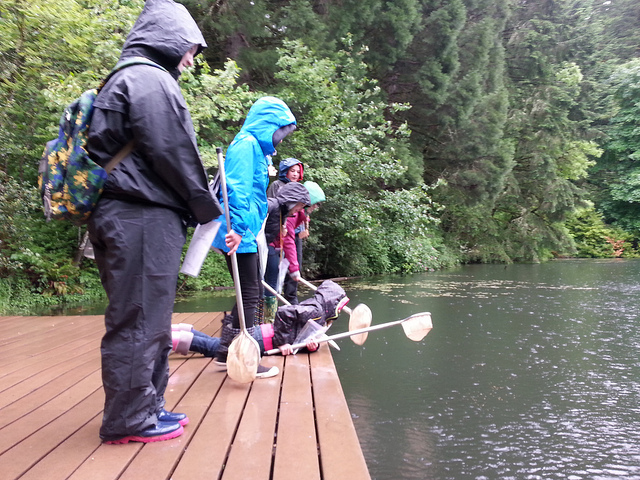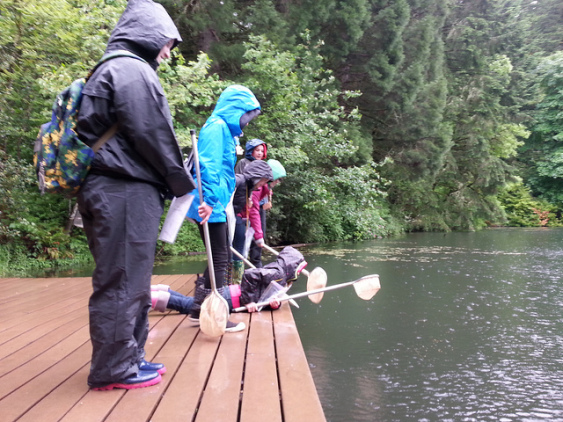The McCleary decision! High-stakes testing! Common Core!
In the Northwest’s raging and incessant debate about education funding, testing, and standards, the question of what gets taught is never far from center stage. A growing network of schools and reformers starts from the premise that 21st century challenges from economic globalization to climate change call less for content mastery than for a set of abilities that group loosely around “learning how to learn.”
The emerging field of “Deeper Learning” seeks to shift educators’ focus from “teaching to the test” to helping children learn to think, communicate, collaborate, and initiate. School districts across Cascadia and beyond face the challenge of how to retool classrooms and educators to impart these 21st century skills.
One of the best ways to deliver Deeper Learning, though, requires no classroom walls at all. Hands-on learning about nature, in nature, switches children into a discovery mode: the place where deeper learning happens.
One such program, Oregon’s Outdoor School has been connecting sixth graders with nature for five decades. School funding shortfalls have put this program at risk. As I wrote in Sunday’s Oregonian:
A wedge of inequity has split the treasured Outdoor School experience into a ‘lite’ version – good enough for public school kids – and a ‘full’ version for schools and communities that choose to pay more . . . The full benefits of residential outdoor learning cannot be absorbed in just 72 hours.
New awareness of the learning benefits that Outdoor School delivers may help advocates restore and expand the program, bringing a real Deeper Learning experience to thousands more children.
Read the column here.










Jan Steinman
We have a similar program in BC, in which we teach sustainable organic agriculture techniques to all ages. We hosted a group of elementary students this summer, plus eleven Korean middle-school students.
Kids need more than classroom exposure to the natural world!
Kurt Sahl
Teachers are buried in administrative dictums, but do seek ways to get their students outside where truly deep learning can occur. At 21 Acres in Woodinville–where a field trip program attracts hundreds of students from K-12 and higher education schools and colleges adjacent to Lake Washington–building student and teacher understanding of re-localizing our food system involves multiple experiential learning opportunities. Students “get their hands dirty” and learn how food is grown, harvested, and have opportunities to prepare nutritious meals with fresh organic produce. Inside, classes take place in a newly LEED Platinum-certified building, one of 35 in the Pacific Northwest.
Getting students out of their classrooms is the challenge. Teachers face tremendous pressure preparing their students to meet learning standards, despite the lack of meaningful real-life or “authentic” learning experiences. Artificially concocted and abstract classroom experiences are poor proxies for learning about the environment. In their attempts to schedule meaningful field trips, teachers typically encounter an onerous permission process and eventually succumb to dreaming about the learning that could have been. Administration, transportation, and liability issues are daunting barriers to pursuing field trip opportunities with too many educators choosing to skip the hassle associated with planning them. Parents need to speak up and request more outside activities so their children have the opportunities to build cognitive anchors upon which deep learning can be structured.
21 Acres is moving to make these experiences more convenient for high school students by partnering with the Northwest Liberty School which will offer a new course, “Sustainable Agriculture and Food Systems” beginning February 2015. For those interested, the course will continue beyond the end of the spring term into the summer term. Building a local food economy will require more than farmers. It will demand more innovation in food storage, distribution, and value added products. In 2013, of the $6B King County residents spent on food and beverages, only 2% was from local sources. Surely our region can support the economic development of re-localizing our food system. Knowledgeable students who want to improve their communities and neighborhoods will understand the value of local farms and the output from those farms.
Learning in outdoor environments manifests itself in different ways and doesn’t have to be associated only with agricultural content knowledge. Future extremes in weather patterns will require collective problem solving strategies applied across a variety of disciplines and situations. Those individuals who understand earth systems and have had meaningful and engaging outdoor learning experiences will have a leg up on assessing proposals and forwarding innovations to mitigate and alleviate challenges associated with climate impacts. Accelerating the occurrences of outdoor learning opportunities can link students to their role as stewards of Earth and re-connect them to the natural world. Moving forward, sustainable development efforts will require disciplinary knowledge and dispositions acquired over time and reinforced through opportunities beyond the classroom.